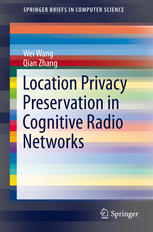

Most ebook files are in PDF format, so you can easily read them using various software such as Foxit Reader or directly on the Google Chrome browser.
Some ebook files are released by publishers in other formats such as .awz, .mobi, .epub, .fb2, etc. You may need to install specific software to read these formats on mobile/PC, such as Calibre.
Please read the tutorial at this link: https://ebookbell.com/faq
We offer FREE conversion to the popular formats you request; however, this may take some time. Therefore, right after payment, please email us, and we will try to provide the service as quickly as possible.
For some exceptional file formats or broken links (if any), please refrain from opening any disputes. Instead, email us first, and we will try to assist within a maximum of 6 hours.
EbookBell Team

5.0
70 reviewsThis brief focuses on the current research on location privacy preservation in cognitive radio networks (CRNs). Along with a review of the existing works, this book includes fundamental privacy models, possible frameworks, useful performance, and future research directions. It explores privacy preservation techniques, collaborative spectrum sensing, database-driven CRNS, and modeling potential privacy threats. Conflicts between database owners and unlicensed users can compromise location privacy, and CRNs are a means to mitigate the spectrum scarcity issue due to the increasing demand for wireless channel resources. By examining the current and potential privacy threats, the authors equip readers to understand this developing issue. The brief is designed for researchers and professionals working with computer communication networks and cognitive radio networks. Graduate students interested in networks and communication engineering will also find the brief helpful.